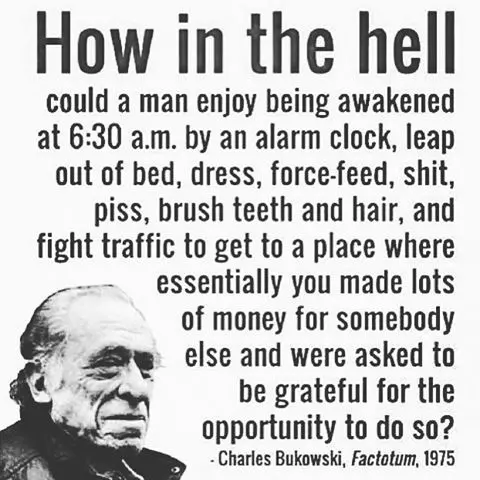this post was submitted on 29 Oct 2023
1536 points (97.3% liked)
Work Reform
13991 readers
4 users here now
A place to discuss positive changes that can make work more equitable, and to vent about current practices. We are NOT against work; we just want the fruits of our labor to be recognized better.
Our Philosophies:
- All workers must be paid a living wage for their labor.
- Income inequality is the main cause of lower living standards.
- Workers must join together and fight back for what is rightfully theirs.
- We must not be divided and conquered. Workers gain the most when they focus on unifying issues.
Our Goals
- Higher wages for underpaid workers.
- Better worker representation, including but not limited to unions.
- Better and fewer working hours.
- Stimulating a massive wave of worker organizing in the United States and beyond.
- Organizing and supporting political causes and campaigns that put workers first.
founded 2 years ago
MODERATORS
you are viewing a single comment's thread
view the rest of the comments
view the rest of the comments

The suggestion was that workers ("we") should seek to automate processes that workers prefer not to perform.
Your objection was that if such automation were possible to achieve and to implement, then they would have already done so.
Processes of production, and the utilization and development of machinery implicated in production, is determined by business owners, not by workers.
Business owners are bound by the profit motive, not by a motive to improve the experience of workers.
Any activity or objective not supported by the profit motive is simply discarded, under our current systems.
The meaningful suggestion is that workers ("we") should seek to automate processes that workers prefer not to perform, even if business owners ("they") have no motive for doing so.
Workers already are the ones who design and build machines, but our capacities are constrained by business owners, who control the resources of society, including the enterprise that conducts research and manufacturing, and who direct the labor of workers for using the resources they control.
You are attacking a straw man.
Some automation is profitable, at any particular time, but some automation may improve the experience of workers without being profitable.
Various relevant factors include the availability of technologies previously developed through public investment, the degree by which private enterprise is competitive versus monopolized, the structure of the labor pool especially in its degree of stratification, and the relative profitability of other investment opportunities, such as those more overtly framed around speculation, predation, extraction, or exploitation.
Engineers are workers.
Sewer cleaners are workers.
Neither are business owners, who make the decisions within enterprise, about how workers use enterprise.
If business owners decide that engineers would design machines, that factory workers would then build, and that sewer cleaners would then utilize, then the events may occur. Otherwise, not, and the determining force is the profit motive, not the will of workers.
The straw man you attacked was my alleged claim that no automation is ever profitable.
In fact, at any particular time, some automation may be profitable, and some automation may not be profitable.
We are discussing the reasons certain workers may be prevented from having better experiences through automation, even if development, manufacturing, and utilization of relevant automated systems are possible in principle, through the collective capacities of workers as a class.
You asserted the premise that the nonexistence of certain systems of automation is sufficient evidence for us to conclude the impossibility of their being caused to exist.
The premise is obviously false.
I have observed that workers as a class (inclusive of engineers, factory workers, and all others) may have the capacities to provide automated systems either that improve the experience of those working to clean sewers, or that may obviate the social need of anyone to be working as such.
I also have observed that utilization of enterprise, and direction of worker capacities, is currently controlled by business owners, bound by the profit motive.
Your premise is false, that all automation always is supported by the profit motive, and my alleged premise is a straw man, that no automation ever is supported by the profit motive.
Your suggestion, that "if we could, we would have already" "automate[d] the jobs", is false.
Its flaw is that it erases the conflict of interest between workers and owners. subsuming both beneath an imaginary monolithic "we", who would all share the same interests.
In fact, workers and owners have mutually antagonistic interests.
Owners seek to extract the maximal possible value from workers at the minimal possible cost.
Workers seek better conditions, higher wages, and greater freedom and enjoyment in their lives.